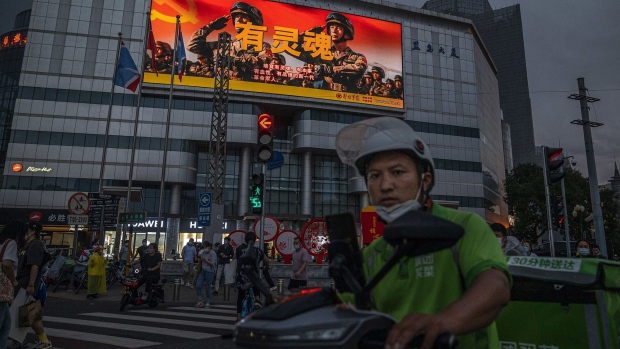Oct 21, 2022
China’s ‘Hostile Behavior’ Prompts EU to Explore Strategy Shift
, Bloomberg News

(Bloomberg) -- The European Union is taking a harder look at relations with China as tensions deepen, with one member state calling Beijing more of a “systemic rival” than a trade partner.
EU leaders spent three hours on Friday discussing how to recalibrate 27-member bloc’s increasingly fraught relationship with the world’s second-largest economy. With President Xi Jinping poised to extend his decade-long tenure and grip on power, they said the EU needs to reassess its way of dealing with China.
“What we are seeing is that the assertiveness of China in the world domain is increasing,” Dutch Prime Minister Mark Rutte told reporters after the two-day meeting in Brussels. Still, he said the bloc will continue to maintain dialog with China.
Lithuania President Gitanas Nauseda went further, saying China’s backing of Russian President Vladimir Putin since the Kremlin’s invasion of Ukraine shows that Beijing is a “systemic rival.” Lithuania has been on the receiving end of China’s punitive measures after the Baltic nation allowed Taiwan to set up an office in Vilnius last year.
“We see how our decision regarding the Taiwanese office, which is no diplomatic representation, has provoked pressures from China,” Nauseda said. “But we’ve compensated the trade losses from China and have managed to withstand pressures.”
The comments challenge the EU’s long-running balancing act regarding China as both a trade partner and an economic competitor. A key refrain among leaders was the EU’s need to secure its independence by protecting key infrastructure and promote advanced industries, such as semiconductor production.
French President Emmanuel Macron said Europe had erred in focusing too exclusively on public finance, forcing member states in the past to sell crucial infrastructure to Chinese investors, exposing the region’s vulnerability.
“We’ve been naive because we considered that there was a public-finance issue to fix -- and that Europe was an open supermarket,” Macron told reporters. The bloc needs to establish rules on infrastructure and define “sensitive points.”
Latvian Prime Minister Krisjanis Karins compared a dependent relationship with China on technology and raw materials with EU’s tumultuous shift away from Russian energy after the Ukraine invasion.
“Yes, we are actually quite dependent,” Karins said in an interview. “So it is now the right time to reevaluate this dependence and to take measures to reduce that.”
EU leaders discussed China as well as the war in Ukraine and economic policy on its second day of the summit. The meeting comes after the bloc’s foreign policy arm recommended strengthening the EU’s approach to China.
Earlier this week, EU foreign policy chief Josep Borrell said China was increasingly becoming a “tough competitor,” while reaffirming the bloc’s approach to treating the nation as a partner, competitor and systemic rival.
“We as Europeans need to get over our somewhat naive stance,” Belgian Prime Minister Alexander de Croo said. “That doesn’t mean that we don’t want a relationship with China, but we must avoid any kind of dependence.”
--With assistance from Katharina Rosskopf, John Follain, Andra Timu, Natalia Drozdiak, Stephanie Bodoni and April Roach.
©2022 Bloomberg L.P.





